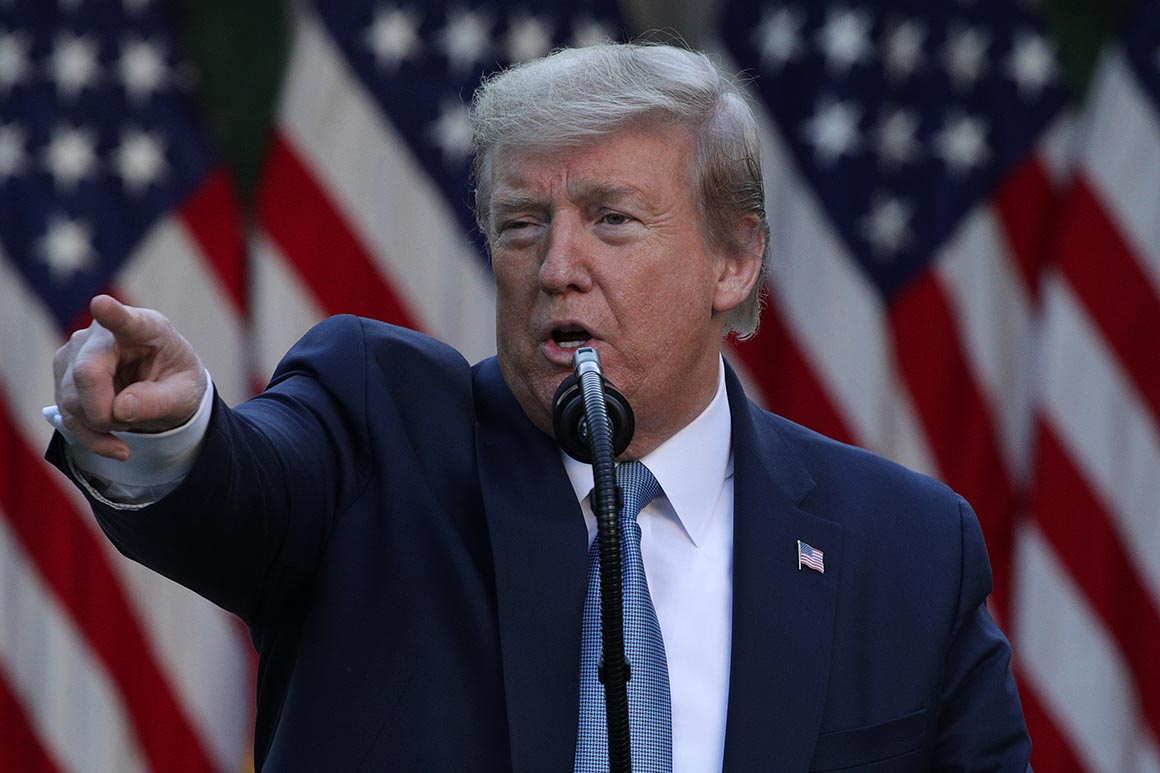
Trump said the coronavirus pandemic has brought into stark relief the Senate’s failure to approve a large number of his nominees, and he cited unprecedented „obstruction“ by Democrats more than three years into his term as the reason for potentially opening this new front in his many legal battles with Congress.
„If they don’t act on getting these people approved — we need them anyway — but we especially need now because of the pandemic, we are going to do something … I prefer not to do but I should do and I will do if I have to,“ Trump said at Wednesday’s news conference.
„They’ve been warned, and they’re being warned right now,“ Trump added. „We’ll probably be challenged in court, and we’ll see who wins.“
White House officials said Trump is „extremely serious“ about taking this unprecedented action, although they cautioned that the president has some time to make a decision about whether to go forward with it or not.
The full Senate won’t return to Washington until at least May 4, although the body is holding pro forma sessions in the meantime, in part to prevent Trump from making recess appointments. If Trump does attempt to adjourn Congress, that would take place at least 10 days before the Senate is back, a length of time that would comport with a 2014 Supreme Court decision on the issue, administration sources suggested.
Senators of both parties have traditionally been wary of recess appointments, seeing it as an infringement on the body’s power to approve executive branch nominees. Senate Majority Leader Mitch McConnell (R-Ky.) joined more than 40 other Republicans in a legal challenge to a trio of former President Barack Obama’s recess appointments to the National Labor Relations Board in 2012.
Republicans ended up winning that case after the Supreme Court ruled unanimously in 2014 that Obama had overstepped his authority. The Supreme Court said that only the Senate — not the president — can decide when it is in session.
McConnell’s office didn’t comment directly on Trump’s adjournment threat beyond saying the president and McConnell spoke Wednesday regarding the issue of Democrats continuing to filibuster Trump nominees. McConnell and Senate Republicans used the „nuclear option“ to change Senate rules in 2019 to require a simple majority to approve nominations, and then used that power to push everyone from Cabinet picks to well over 150 federal judges on largely party line votes.
“Leader McConnell had a conversation today with the president to discuss Senate Democrats’ unprecedented obstruction of the president’s well-qualified nominees and shared his continued frustration with the process,“ said a McConnell spokesman. „[McConnell] pledged to find ways to confirm nominees considered mission-critical to the COVID-19 pandemic, but under Senate rules that will take consent from Leader Schumer.”
Under the Constitution, presidents have the authority to adjourn Congress but only under limited and very specific circumstances. Article II, Section 3 to the Constitution states that the president „may, on extraordinary Occasions, convene both Houses, or either of them, and in Case of Disagreement between them, with Respect to the Time of Adjournment, he may adjourn them to such Time as he shall think proper.“
No president has every used this authority, and if Trump did, Democrats — and even some Republicans — would strongly object.
But Trump and his senior aides believe congressional leaders are misusing their authority by allowing Congress to leave Washington without formally recessing. If Congress were to do so, and that recess were longer than 10 days, Trump could then make recess appointments.
The 2014 Supreme Court decision also did „leave open the possibility that some very unusual circumstance — a national catastrophe, for instance, that renders the Senate unavailable but calls for an urgent response — could demand the exercise of the recess-appointment power during a shorter break,“ according to the opinion.
Marianne LeVine contributed to this report.
Source: politico.com
See more here: news365.stream






